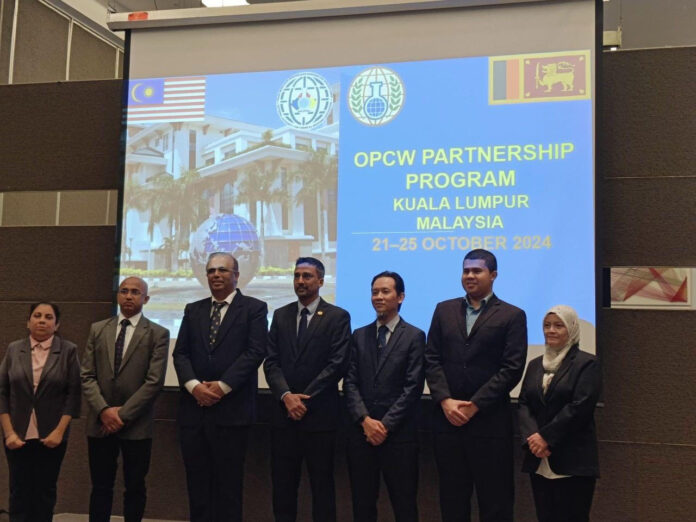By Dr. Raja Subramanian
Dr. Raja Subramanian outlines Malaysia’s commitment to and track record of hosting OPCW training exercises.
The threat of chemical weapons knows no borders. In an era where global security hinges on collective preparedness, the Organisation for the Prohibition of Chemical Weapons (OPCW) has emerged as a cornerstone of international efforts to combat chemical threats.
At the heart of this mission lies the OPCW’s Assistance and Protection Branch (APB), which empowers States Parties with the tools, training, and expertise needed to respond effectively to chemical incidents. Under Article X of the Chemical Weapons Convention, the APB has spearheaded capacity building initiatives that enable nations to safeguard their citizens and mitigate the risks posed by chemical hazards.
Since 2013, Malaysia has risen as a regional leader in this critical endeavor, transforming into a hub for APB training in Asia. With nearly 300 first responders trained over the past decade, Malaysia’s contributions reflect not only its commitment to global security but also its own growing expertise in chemical threat response. This brief article explores Malaysia’s journey as an OPCW training provider, highlighting its innovations, challenges, and the lessons learned along the way.
Benchmarking Excellence: Malaysia’s Commitment to Global Standards
Malaysia’s journey as an OPCW training provider began in 2013 through its Fire and Rescue Department (FRDM), known locally as BOMBA. Initially offering basic training courses focused on hot zone sampling, the program quickly expanded as Malaysia’s pool of trained instructors grew. By 2017, the country was ready to deliver advanced courses emphasizing practical, hands-on training.
The COVID-19 pandemic in 2020 posed unprecedented challenges, but Malaysia responded with agility, developing online training modules that remain in use today by the OPCW and States Parties to the Chemical Weapons Convention. Looking ahead, Malaysia is set to host the newly introduced eight-day integrated advanced course in 2025, which balances 30% theory with 70% practical application. This is a testament to the country’s continuous evolution in chemical response training.
To meet the OPCW’s rigorous standards, FRDM undertook an extensive benchmarking process, studying established programs, consulting experts, and conducting gap analyses. These efforts have solidified Malaysia’s reputation as a reliable and innovative training provider.
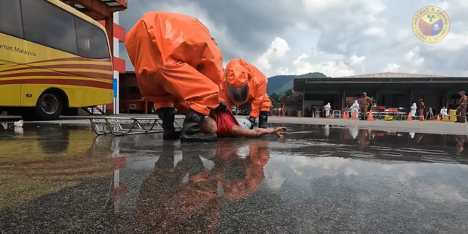
A Decade of Evolution and Innovation
Over the past decade, Malaysia’s training programs have undergone significant transformation, driven by a commitment to innovation and excellence. Key milestones include:
Integration of real-world scenarios: FRDM has incorporated multi-injection exercises, including night drills and adverse weather operations, to prepare participants for the realism and unpredictable nature of chemical incidents.
Advanced risk management: Training modules now emphasize comprehensive risk assessment and mitigation strategies, equipping responders with the knowledge to navigate complex scenarios.
Continuous education programs for instructors: Through collaboration between the Malaysian National Authority to the Chemical Weapons Convention, the OPCW, and other regions, Malaysia’s instructors have benefited from advanced continuous education programs such as live agent training, ensuring they remain at the forefront of CBRN response capabilities.
These innovations have not only enhanced the quality of Malaysia’s training programs but also strengthened its position as a regional leader in chemical preparedness.
Navigating Challenges: Lessons from the Field
Malaysia’s progress has not been without hurdles. The diversity of participants – spanning various cultures, languages, and operational frameworks – has required adaptable and inclusive training approaches. Resource limitations have also posed challenges, particularly in hosting large-scale, scenario-based exercises.
Moreover, the evolving nature of chemical threats demands constant adaptation. Emerging technologies, such as drones and long-range detection systems, as well as the need for night and harsh tropical weather operations, have necessitated regular updates to training curricula. Despite these challenges, Malaysia has demonstrated resilience and ingenuity, leveraging its experience to refine its programs and share best practices with the global community.
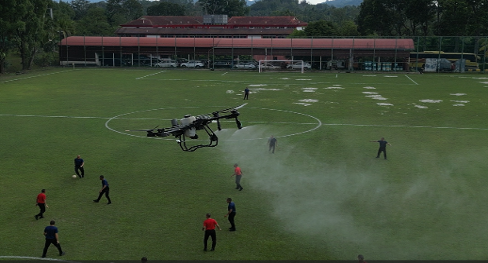
Best Practices for Global Preparedness
Malaysia’s experience as an OPCW training provider offers valuable insights for other nations seeking to bolster their chemical response capabilities. Key best practices include:
Holistic training modules: Courses address every aspect of chemical incident response, including reconnaissance, rescue operations, command and control, use of detectors (including stand-off), decontamination procedures, quick reference guides, PPE, sampling techniques, and post-incident recovery, thereby ensuring comprehensive readiness.
Innovation in training: Innovative approaches have been incorporated into training programs to address specific participant needs. Examples include indigenous sampling techniques and makeshift decontamination methods tailored for victims with special requirements, ensuring adaptability in diverse scenarios.
Continuous improvement: Training curricula are regularly updated to reflect the latest insights from participant feedback, OPCW recommendations, and evolving threat landscapes. This commitment to adaptation ensures our programs remain current, relevant, and effective.
Experienced instructors: Instructors with real-world experience bring invaluable expertise to the classroom, bridging the gap between theory and practice.
Regional collaboration: Malaysia has actively promoted knowledge-sharing and cooperation among regional partners, fostering a collective approach to chemical preparedness.
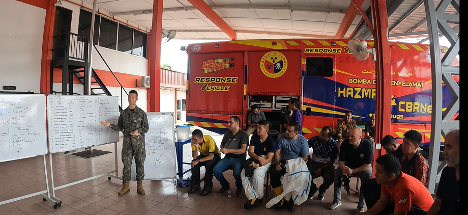
The Rewards of Leadership
Malaysia’s role as an OPCW training provider has yielded profound benefits, extending far beyond the immediate scope of chemical preparedness. These rewards underscore the value of investing in global security and capacity building.
Enhanced national preparedness: By hosting and participating in OPCW training programs, Malaysia has fortified its own CBRN response framework. This has not only elevated the country’s ability to address domestic threats but also positioned it as a reliable first responder in regional emergencies.
Knowledge transfer and sustainability: The program has cultivated a cadre of highly skilled instructors who have become senior experts in their field. Their expertise is now being transferred to the next generation of responders, ensuring long-term sustainability and continuous improvement in Malaysia’s chemical response capabilities.
Global recognition and influence: Malaysia’s commitment to excellence has earned it recognition as a regional leader in CBRN capacity building. This reputation has cemented its role in global security efforts, enhancing its standing within the OPCW and among international partners.
Strengthened chemical diplomacy: Serving as a training hub has fostered closer diplomatic relationships with the OPCW and other States Parties. These collaborations have not only advanced global security but also opened doors for Malaysia to play a more active role in shaping international policies and initiatives.
Regional ownership and collaboration: Through initiatives like the OPCW Mentorship Program with Sri Lanka in 2024, Malaysia has encouraged regional partners to take ownership of their preparedness efforts. This spirit of cooperation has strengthened collective resilience and fostered a sense of shared responsibility in addressing chemical threats.
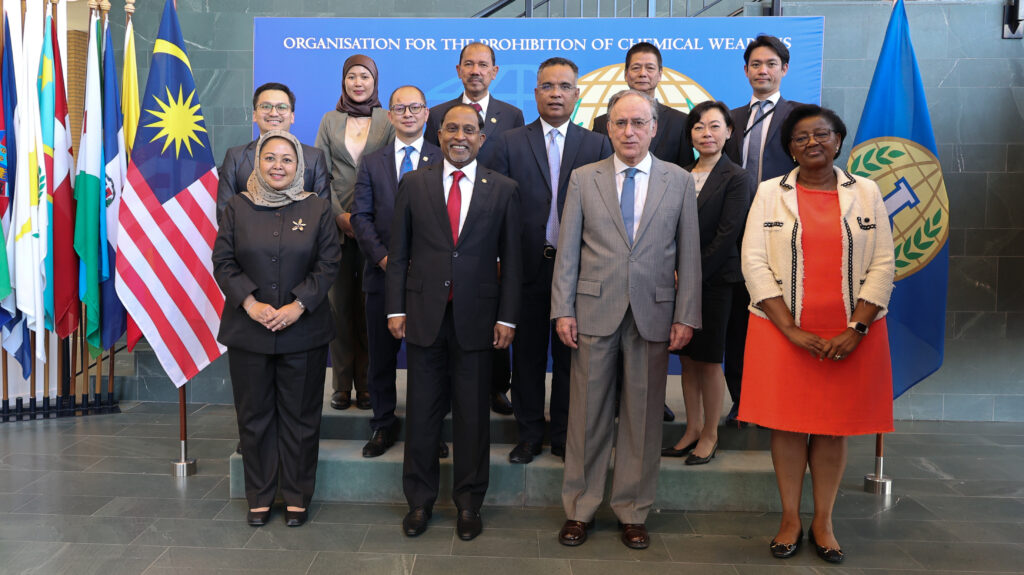
A Safer World Through Collaboration
As Malaysia reflects on its decade-long journey as an OPCW Assistance and Protection Branch training provider, its contributions extend far beyond fulfilling its obligations under Article X of the Chemical Weapons Convention. Through innovation, collaboration, and unwavering commitment, Malaysia has built resilience at both national and regional levels, helping to create a safer world for all.
Looking ahead, Malaysia envisions a future where training providers are standardized and accredited according to the OPCW Proficiency Test scheme, ensuring consistency and excellence in chemical response training. By sharing its expertise and encouraging other States Parties to join this vital effort, Malaysia continues to pave the way for a more secure and prepared global community.
Dr. Raja Subramaniam, co-founder of the OPCW APB training provider in Malaysia, is also a member of the OPCW Scientific Advisory Board (SAB). He specializes in Chemical Warfare Agent (CWA) detection. Special thanks to SAC Murugiah Muthusamy from the FRDM, founder of the APB course for Malaysia and Head of Operation Section of the FRDM, for proofreading the article.


